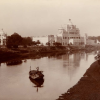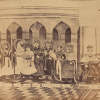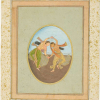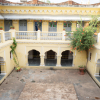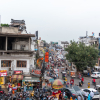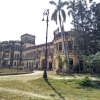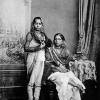Jagtar Singh Grewal is a prominent historian of medieval and modern Indian history, especially the history of the Punjab and Sikhs. He has published over three scores of books—monographs, collections of articles, Persian sources and other edited works—and over a hundred research papers in the past 55 years. His publications relate to the history of historical writing, Indian history, both medieval and modern, history of the Punjab region from pre-historic times to the present, Punjabi literature as a source of history, and the history of the Sikhs from the late fifteenth century to the present.
Born in a Sikh village in Punjab, in pre-Independence India, Grewal was interested in history since childhood. He received his PhD in History from the University of London in 1963 for his thesis on British historical writing on medieval India. This was the first thesis on historiography by an Indian scholar. Later it was revised and published as Muslim Rule in India: The Assessments of British Historians (1970).
Grewal joined the faculty of Punjab University in 1964 and, in 1969, his Guru Nanak in History, was published by the university as a part of Guru Nanak’s quincentenary birth celebrations. Path-breaking in its approach, the book drew from sources other than Guru’s compositions, analysed the political, social, and religious milieu of the times and his responses to them. This work earned Prof. Grewal his D.Lit. in 1971. He was invited by Cambridge University Press in 1980 to write a volume on the Sikhs for the New Cambridge History of India series. A round study of change and continuities in the context of the region and the country, The Sikhs of the Punjab, was published in 1990 and has been reprinted many a time to become a classic.
The importance of urban studies was recognised in India when Prof. Grewal published In the By-Lanes of History: Some Persian Documents in 1975. In this work, Grewal studies 150 deeds of sale, mortgage, gift, agreement and declaration executed in the court of the qazi of Batala town from the late seventeenth to the early nineteenth century in Punjab. Through a rigorous analysis of these documents and their seals and hundreds of attestations in different scripts, combined with the evidence of other sources, including frescos, inscriptions, graffiti, and field work, Prof. Grewal reconstructs the history of a medieval Indian town.
By the time he retired in 1987, Prof. Grewal had gained a formidable reputation as a historian, known for his rigour and meticulousness. In 1984 he had been elected as the General President of the Indian History Congress. The Indian Council of Historical Research invited him to be a National Fellow, and he wrote two books: Historical Perspectives on Sikh Identity (1997) and Contesting Interpretations of the Sikh Tradition (1998) to facilitate a dialogue between Western academia and Sikh scholars. Subsequently, he was invited by the Centre for the Study of Civilizations, New Delhi, to be an Editorial Fellow for preparing two volumes on the History of Medieval India: The State and Society in Medieval India (2005) and Religious Movements and Institutions of Medieval India (2006). During 2006–08, he was invited as a Visiting Professor at the Punjabi University, Patiala, and he delivered over a hundred lectures on different themes. Selections from these lectures have been published by the university in two volumes. Invited to be the Professor of Eminence at the same university during 2010–16, he produced a monumental study, entitled Master Tara Singh in Indian History: Colonialism, Nationalism, and Politics of Sikh Identity (2017). This monumental work reveals nearly all important aspects of Master Tara Singh as the most important Sikh leader in twentieth-century India.
Some of the other publications of this phase are significant for the choice and treatment of the subject by Prof. Grewal. In the History, Literature, and Identity: Four Centuries of Sikh Tradition (2011) he analysed the core of Sikh texts from the sixteenth to the nineteenth century to discuss issues like conscious conceptualisation of a new dispensation, processes of community formation, social transformation, and politicisation leading to the emergence of a new political order. This is complemented by another volume analysing secular Punjabi literature from the thirteenth to the twentieth century, entitled Historical Studies in Punjabi Literature (2011). Prof. Grewal emphasises that the emergence of new literary genres during the colonial period is a pointer to social transformation, but a work of literature has to be unwound to get at the historical situation that produced it. Prof. Grewal’s most recent work, Guru Gobind Singh (1666-1708): Master of the White Hawk (2019) highlights that the unifying theme in the life of Guru Gobind Singh was confrontation with the Mughals, which culminated in a struggle of political power and the creation of the Khalsa in 1699 as a political community with the aspiration to rule.
Several awards were conferred on Prof. Grewal, including those by the Asiatic Society, Kolkata, Asiatic Society, Bihar, Khuda Bakhsh Oriental Public Library, Patna, Sikh Educational Society, Amritsar, Punjabi University, Patiala, and Panjab University, Chandigarh. In 2005, the President of India awarded the Padma Shri to Prof. Grewal for his intellectual and academic contributions.
Following is the edited transcript of fourth segment of the conversation with Prof. J.S. Grewal conducted jointly by Prof. Indu Banga and Dr Karamjit Malhotra
Indu Banga (IB): After Prof. Grewal went to Amritsar, it becomes very difficult to classify things in any straitjacket manner. So I was thinking that maybe we simply mention different positions that he held during this period and then come to some specific works and some specific aspects of his work which need to be emphasised. He had two options actually when he joined Guru Nanak Dev University, Amritsar, as Professor and Founder Head. He had already been selected for JNU but he decided not to go to JNU and go to Amritsar. So I would like to first ask you, sir, why did you decide in favour of Amritsar whereas JNU was the hub of historical research and teaching at that time?
J.S. Grewal (JSG): Actually the most important point in favour of Amritsar was that a new department could be started there and a new centre of historical research could be developed. That was the main reason.
JSG: I think we tried to and did reasonable work. And the research work done by the students was in some new areas and this was appreciated by fellow historians. Prof. Barun De referred to the new historical centre coming up at Amritsar.
IB: I recall this was in the Indian History Congress session of 1988. While giving his presidential address, he made a detailed reference to the Amritsar School of Historiography and how it had corrected the earlier assumptions regarding the eighteenth century Sikh polity or misls and so forth. And, of course, credited you and your students with the discovery of new evidence and a very fresh interpretation of that evidence. Certainly, it must have been very gratifying at that point.
You were also the first Dean of Guru Nanak Dev University. And you remained in that position for four years. So that must have been a great opportunity to shape the university too.
JSG: That is true. The Founder Vice Chancellor was very keen that the university should develop as one of the good institutions in the country. And he gave me a lot of freedom actually as the Dean of Academic Affairs to plan things, to do things. The new departments were made. I think they were very good. He tried to persuade some of the best scholars in the country to come to the university.
JSG: More and better research was done during those years at Amritsar.
IB: You were a visiting fellow in some universities outside India and also at Patiala for some years and this must have been a fruitful phase too.
IB: And then from Toronto you came to the Indian Institute of Advanced Study.
JSG: This is after my university career ended. I retired in 1987.
IB: Yes, after you retired, you went to Toronto.
JSG: I went to Toronto as a Visiting Professor.
IB: And then you came back to the Indian Institute of Advanced Study as a Fellow. And then within a year you were appointed its Director in, I think, 1989, was it?
JSG: 1989, yes.
IB: You gave a new lease of life to the Institute which was virtually defunct at the time of your joining it.
JSG: It was in bad shape, that is true. And it came up, came up well in two or three years. Once again there was a lot of work which was being done at the Institute.
IB: Anything that you particularly recall of your tenure there as Director?
JSG: My idea immediately was to request some of the best people to come from different disciplines and do the kind of work they wanted to do. And interact. And also, during that tenure we had an understanding with the UGC so that college teachers could come to the Institute for three months.
IB: Talking about the similar kinds of responsibilities that you held, you were also the Editorial Fellow of the Project for History and Science in Indian Civilisation (Project of History of Indian Science, Philosophy and Culture), PHISPC, as I think it is called. So as an Editorial Fellow you had to devise, formulate the project History of Medieval India. A one volume project. But it actually came out in two volumes, State and Society and Religious Movements [and Institutions], two huge volumes. Did you have complete autonomy in the conceptualisation of these projects?
JSG: That gave me the opportunity to work according to some of the ideas I had since the early research I thought of. I wanted to do work on social history of medieval India and here was an opportunity to do something of that vision so to speak. And I planned these volumes in a way that we talked about society and the state and also the religious movements in the country as a whole. And these two volumes are used as reference volumes, I hear. And well received in that way. Prof. Irfan Habib wrote a good review of the two volumes.
IB: Then you became the Life Fellow of the Punjabi University in 2005. And then Director of the World Punjabi Centre in 2006. So, what did you do as Director of the World Punjabi Centre?
JSG: I tried to invite scholars, public men from different parts of the world and held a conference in order to chalk out the programmes of the institute, of the World Centre, not only in terms of Punjabi literature but also social studies related to the Punjab. Not only the people living here in Indian Punjab or Pakistan but also the Punjabis abroad, with a broad vision of what sort of work would be done in coordination with scholars in different parts of the world so far as Punjab is concerned. And the conference was, I think, it was attended by a good number of scholars and it was satisfactory in its own way.
IB: But you built the department, you made a substantial contribution.
JSG: I do believe that that if you hold a position, you should try to do the best you can for that, whatever possibility [one has]. And not think of your own future. Attend to what you are required to do for that institution.
IB: This is what you think it takes to build institutions.
JSG: I think this commitment to the institution itself is the primary sort of requirement. Loyalty to the institution you are serving and trying to improve. Prof. Nurul Hasan also had that idea. In fact, he suggested that there was no harm in taking up administrative responsibilities because if your work as a scholar is good, if you are in a position to change things for the better, there is a possibility of, and also the desirability of, taking it up and trying to do your bit.
IB: I have noticed you function in some of these capacities, and I distinctly recall a few things. For example, at the Institute you were always available to the Fellows. You worked seriously but you were affable. You used a lot of tact in dealing with the combustible material that a scholar is or that a Fellow could become so that they could feel comfortable in that environment and they could also turn to you for advice, sometimes even for their personal matters, personal problems. And I also recall that some of the women scholars visiting the Institute felt extremely comfortable with the way you treated them as persons. So this was one thing which I noticed with, I think, a lot of admiration.
But then, at the Amritsar end, I also noticed that you had a lot of sympathy for the students who had come from rural areas. You were conscious of their handicaps, their difficulties, and sometimes if I happened to be a little impatient with them, sometimes you corrected me and corrected other teachers if they had any urban biases against those students. And you used to say that we have to measure our success [by] what a student was at the time of admission and what he became after two years in the department. And that then became our motto. We were no longer concerned about results. And then several of those students developed and they grew to be professors in the same department. Well, this was I think a great achievement. And then you were always available to students and researchers and colleagues there as well. Heard their problems with patience and sympathy.
JSG: That reminds me that when I started teaching at Chandigarh, I found that Dr Joshi . . . any teacher could see him at any time and that was liked by people very much and it gave a sort of confidence and assurance to them. Probably I had that in mind when at Amritsar I tried [to ensure] that there should be no difficulty in any faculty member seeing the Vice Chancellor for anything at all.
IB: You have been regarded as a great teacher.
JSG: I don’t know.
IB: So what have been the essentials of good teaching?
JSG: My aim generally was to suggest to the students that they should spend their time in the work which they are supposed to do and do it honestly. Honestly in the sense that there is a prescribed course which has to be studied and there is a reading provided. They should try to study that, read that and not use [guide] books or books of that kind. And also try to see that your students did work. For example, we introduced the library hour, the teacher and the students had to be present there and we taught them, in the beginning, how to consult a dictionary and how to consult an index and how to use a book for our purposes. So that was one example. My objective actually was to be very honest and sincere with the students in telling them what they should do in the field they have chosen. And help them in any way we could. And generally, be friendly. Not as a matter of policy, but I felt that way: I could empathise with the students coming from villages and not knowing English well. But at Chandigarh also I worked well with the best of the students. Prof. Banga was one of them.
KM: Do you think that research and teaching are complementary to each other?
JSG: I think yes. Very emphatically. Because research and teaching should go together in order to ensure that the advanced knowledge in that area, in that subject, is made available to the students, and the syllabi should be revised quite frequently in order to include new research which is good research, so that students are studying at any given time not really what was thought 50 years earlier but what was being discussed during their own time. So I think teaching without research is not actually useful but it should not be left at that. The latest result, latest thinking, research in any human area should be known to the students, and they should interact with scholars or those who have done this kind of work—that can serve as an incentive.
IB: Going back to the Amritsar School of Historiography, I think over a 100 PhD and MPhil dissertations and monographs were prepared during your stay there.
JSG: When I look back and look at the articles published, I feel very gratified. It proved to be a good journal at that time. It still continues, I think.
IB: It is continuing. So it was an organ of meaningful research.
JSG: This was also the result of something which I am reminded of. There was the question of prescribing textbooks for various subjects in the university, and the university used to invite tenders from the publishers for this purpose and I used to have contracts with them. And I suggested to the Vice Chancellor, ‘Why shouldn’t the university itself publish these texts?’ I talked to my colleagues and they also became enthusiastic and agreed to work for the university without any remuneration to prepare these textbooks; this decision was taken by the university. The result was that we saved a lot of money and then used this money to bring out journals in various subjects. So at one time there were ten research journals coming out from the Guru Nanak Dev University. I think about half a dozen are still there.


